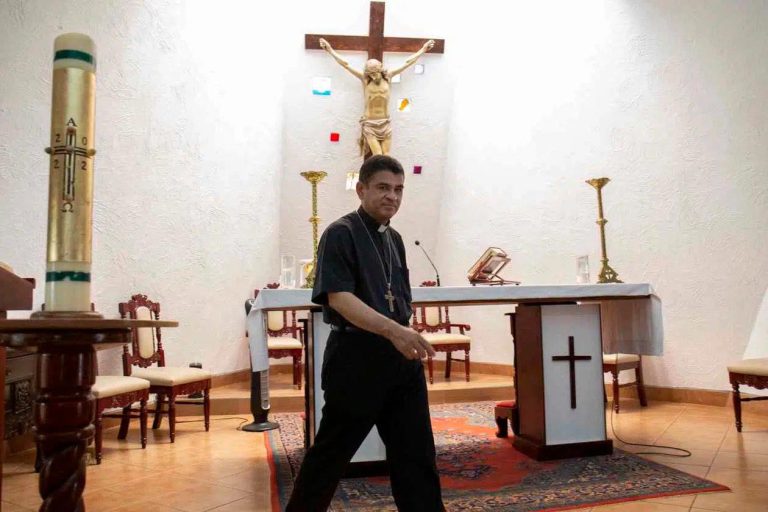22 de mayo 2022

News About Sheynnis Palacios Not Covered by Media Operating in Nicaragua

PUBLICIDAD 1M
PUBLICIDAD 4D
PUBLICIDAD 5D
Writer Sergio Ramirez points out that the Episcopal Conference “should not hesitate to give a unanimous, firm and unwavering support” to the bishop

Nicaraguan Bishop Rolando Jose Alvarez, who began an indefinite fast, prayer and exorcism until the police siege he is suffering ends, said on Friday that the Government of President Daniel Ortega wants “a silent (Catholic) Church,” but that “if the Church were to be silent, the stones would cry out.”
“I am not thinking just on myself, but on the Church’s pastors in general.” What the Government wants “is a silent Church, which will not announce the hope of the people (…) and the denunciation of personal sin and the structures of injustice,” noted bishop Alvarez in an improvised press conference from the “Santo Cristo de Esquipulas” church, located on the outskirts of Managua.
“If the Church were to be silent, the stones would cry out,” added the leader of the Church to a small media group, among them the EFE agency, which managed to enter the parish before it was surrounded by dozens of police officers.
Alvarez explained that, although he has been under surveillance since he began to denounce the government’s abuses, after the social outburst of April 2018 that left hundreds of dead, it was until Thursday that he suffered “a real, true, and authentic (police) persecution.”
Regarding the bishop’s situation, Nicaraguan writer Sergio Ramirez, 2017 Cervantes Prize winner and exiled by the persecution of the regime, commented that “the Episcopal Conference should not hesitate to give its unanimous, firm and unwavering support to Monsignor Alvarez, whose life and security are in danger, his and that of his family.”
“The Vatican should make a very clear expression of repudiation and condemnation of these acts of persecution against one of its most prominent pastors in Nicaragua,” added the novelist in an interview with the program Esta Semana, which will be broadcasted fully on the YouTube channel and other social networks of Confidencial, this Sunday, May 22nd.
“Here (in Nicaragua) we have with us a flock that is backing Monsignor Alvarez, perhaps not in the streets because there is a lot of fear, and this fear is justified, but there is a significant moral support from Nicaraguans,” said the novelist.
The bishop of the Matagalpa’s diocese and also administrator of the diocese of Estelí, both in the north of Nicaragua, confirmed that he will only intake water and physiological saline solution indefinitely until the Police guarantees, through the Episcopate, that it will respect his “constitutional and civic rights to free mobilization and privacy rights of my family.”
Alvarez reported that “two Sandinista Police patrols, full of policemen, (plus) four policemen on two motorcycles,” pursued him “during the whole day (Thursday)” throughout all his movements, so that, for his safety and that of his family, he opted to travel from Matagalpa to Managua and begin the indefinite fasting, prayer, and exorcism.
He explained that his fasting he seeks to prevent that the unjustified police persecution be seen as something normal.
The Episcopal Conference of Nicaragua (CEN) has tried to establish communication with the National Police, which is led by President Ortega’s in-law, to withdraw the harassment against Alvarez, but has not received an answer, the bishop commented.
On Friday, two Police patrols were present at daybreak in front of the parish where Alvarez is “lodged,” also indefinitely, EFE reported.
As time passed by, the number of officers increased and the streets in front of the church was blocked when several journalists showed up.
“This type of situation does not help the country at all, nor the Government, nor the population, or the church either. This does not contribute anything positive for anyone,” he assessed.
The bishop affirmed that he is not afraid of what could happen to him or to his relatives and criticized those who normalize sieges or persecutions.
“I am not afraid, it is simply a question of order and a question of not lending oneself to this type of intimidation, coercion, blackmails, of persecution. If we as Nicaraguan end up seeing this as normal, then would be finished here as a people. And this is not normal, neither in this country nor in any other,” he stressed.
Alvarez is in charge of the communication area of the Episcopate and is one of the most popular and influential priests in Nicaragua.
The Nicaraguan Institute of Telecommunications and Postal Services (TELCOR) ordered this Friday the Nicaraguan cable operators to remove channel 51, the Catholic Channel, which belongs to the Episcopal Conference, from its broadcasting services.
At the time of the removal, this channel was broadcasting a series of religious activities promoted by the Catholic Church in support of Alvarez’s indefinite fast.
President Ortega has labeled as “terrorists,” the Nicaraguan bishops who acted as mediators of a national dialogue which sought to find a peaceful solution to the crisis that the country has been experiencing since 2018.
He also called them “coup plotters,” accusing them of being accomplices of internal forces and international groups that, in his opinion, act in Nicaragua to overthrow him.
Relations between the Sandinistas and the Catholic Church in Nicaragua have been marked by frictions and distrust for the past 43 years.
Nicaragua has been experiencing a political and social crisis since April 2018, which has been accentuated after the controversial general elections of last November 7, before which Ortega jailed his main contenders, and then reelected himself to a fifth term, fourth consecutive and second together with his wife, Rosario Murillo, as Vice President.
*This article was published originally in Confidencial and traslated by Havana Time
Archivado como:
PUBLICIDAD 3M
Confidencial es un diario digital nicaragüense, de formato multimedia, fundado por Carlos F. Chamorro en junio de 1996. Inició como un semanario impreso y hoy es un medio de referencia regional con información, análisis, entrevistas, perfiles, reportajes e investigaciones sobre Nicaragua, informando desde el exilio por la persecución política de la dictadura de Daniel Ortega y Rosario Murillo.
PUBLICIDAD 3D